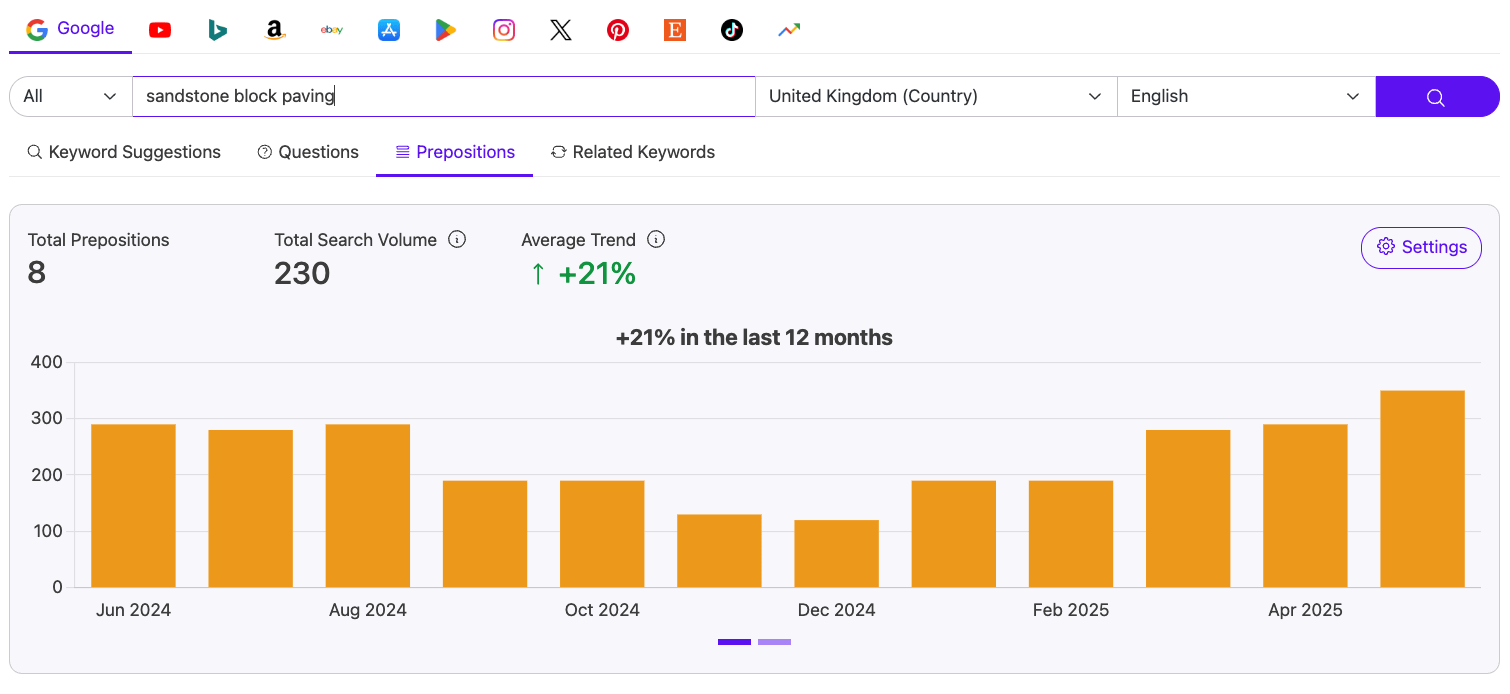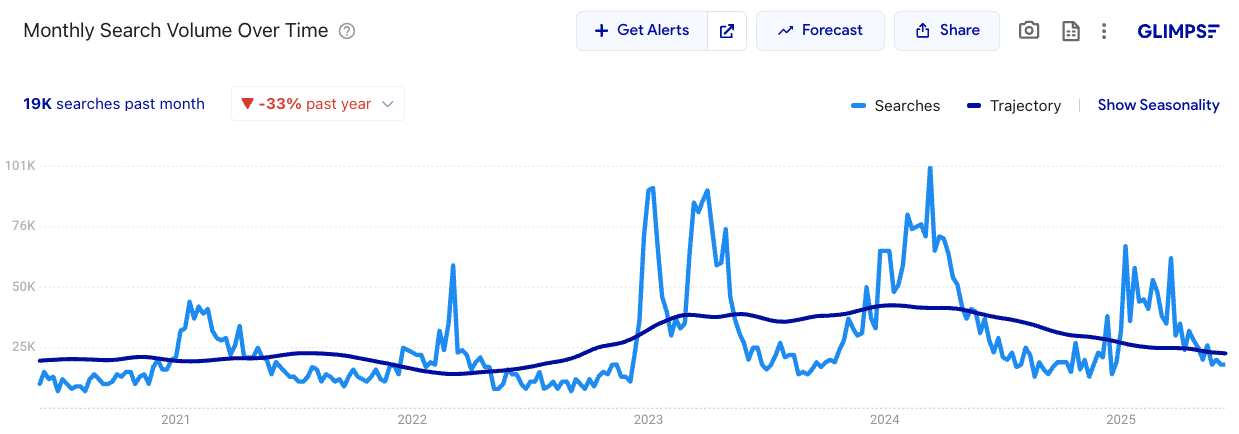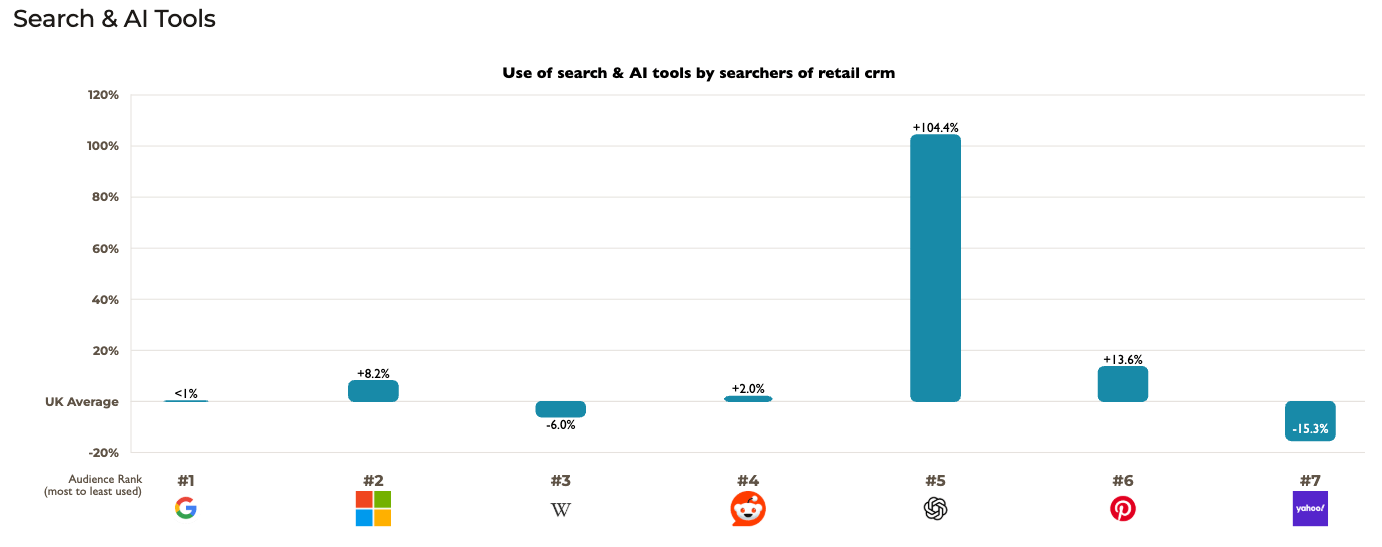How to find trending keywords in your industry
Whether you’re shaping your content strategy, refining your SEO, or trying to uncover what your audience actually cares about, finding trending keywords is a sensible place to start. But knowing where to look (and how to interpret the data) isn’t always easy, especially with the amount of toys available at our disposal.
Why do trending keywords matter?
Identifying content opportunities takes careful planning and consideration; especially with the sheer volume of ways for your content to be found and consumed. It’s why having a solid content strategy is so important, providing that foundation, or backbone, to make sure the content you’re creating will be effective.
One of the major aspects to consider when deciding on written content is the keywords being used. Yep, keywords still matter. We’ve all seen the countless posts about how AI is transforming traditional search, and while this is undoubtedly true, keyword research is still critical to get right – just, in a different way of sorts.
There was the very necessary algorithm changes that led to lazy on-page SEO techniques such as keyword stuffing no longer viable, and we’re now in the midst of the next major change for SEO, where the highly improved semantic understanding search engines now have means traditionally ‘bread and butter’ techniques aren’t as relevant as they once were.
For trending keywords though, these tell us exactly what our audiences are searching for; they help us identify new content opportunities and competitors may be missing. It’s an excellent way to leverage real-world data to create content that is relevant and has the potential to rank in top positions.
They tell you what your audience actually wants
When someone’s typing something into Google, it’s not just a keyword; it’s a problem, a need, or a curiosity. In the most simple sense, the more timely that search is, the more powerful your content can be in answering.
They shape your content strategy
Trending keywords can inform your blog calendar, email subject lines, product descriptions, landing page content, and even your ad copy. Without sounding like a knock-off M&S Food ad, It’s not just an SEO thing, it’s a whole-strategy thing.
They boost your visibility
Search engines reward freshness. Sure, ‘freshness’ isn’t exactly a ranking factor, but search engines are always looking to identify what answers users are seeking to their latest queries. Delivering the best user experience is a focus for search engines so by answering and providing solutions for trending queries, it can somewhat be linked as an off-shoot to delivering a strong user experience. If your content hits a rising search trend early, it’s very much more likely to rank quickly, especially if competition hasn’t caught on yet.
Start with what you know
It’s easy to become fixated on the various tools we can use for identifying trending keywords, and while they play a crucial part – one that we’ll come onto shortly, sometimes it’s worth first taking a step back and looking at what you already know.
Listen to your customers
Customer service tickets, support chats, sales calls, FAQs – every industry and business will have different sources of highly valuable information that can be used to frame your content planning. These are often packed with recurring questions that reflect real-world search intent. If 10 customers ask the same thing, it’s a fair bet others are searching for it.
Revisit your audience personas
What are their pain points? What are they trying to learn, fix, or achieve? Let’s match that thinking to search behaviour. The most valuable resource a business can have is a deep understanding of their audience, so we should always make use of it. Knowing your audience is the first key step in identifying trending keywords and questions they might have.
Follow your industry
Often, the earliest signals of a keyword trend start outside of search, and filter in after. What are the top publications in your space talking about? What are thought leaders posting on LinkedIn for example? Being on the front foot in thought leadership within a given industry offers a plethora of potential opportunities to capitalise on.
Once these 3 have been ticked off, we can start getting into the nitty gritty and opening the toy box to find trending keywords in your industry.
1. Use keyword research tools (Ahrefs, Semrush)
Tools like Ahrefs and Semrush are essential for anyone looking to stay on top of keyword trends. These platforms are so useful for a number of reasons:
- A database of millions of keywords, updated regularly with fresh data
- Related keywords and question-based queries users are actively searching
- Real-time insights from live SERPs using Ahrefs
- Keyword trends over time to identify rising opportunities
- Crucial metrics like keyword difficulty, search volume, and competition
- Advanced filters to narrow your research to the most relevant terms
Bonus tips:
With Semrush, you can plug in your own URL into the Keyword Magic Tool to tailor keyword suggestions to your niche, allowing for more refined results that are specific to your industry.
Use Ahrefs’ Site Explorer to uncover which keywords you’re already ranking for. You can then explore related terms and start building out topic clusters from there.
Exploding Topics is developed by Semrush, and it can be an excellent tool to spot emerging trends relevant to your industry.
If you’re new to this process, start with our guide to conducting keyword research.
2. Discover platform-specific trends
KeywordTool.io helps you discover keyword trends across various platforms and search engines, including YouTube, Bing, Amazon, Instagram and more.
- You can view average trend data for each keyword, showing keywords that have increased in search volume in recent weeks and months

- Explore prepositions (long-tail variations) and question variations to tailor content more effectively
- Select different channels depending on where your audience is most active
- Access accurate data for both Google and Bing
Keyword Tool is especially useful if you’re targeting audiences outside of Google, which is now a necessity in modern organic search. Total Search Optimisation is a framework at Hallam that we’ve introduced to ensure we stay on the front foot with modern search.
3. Engage with AI
We’ve seen, and are seeing, the impact AI answer engines like Perplexity, ChatGPT, and AI Mode are having on search behaviour. These platforms don’t just list links, in fact many in SEO are predicting that the traditional idea ‘10 Blue Links’ may become a thing of the past within the next few years.
Due to the way these AI answer engines work, we now have an opportunity to reverse-engineer how AI interprets a topic and identify what’s missing or underexplored. Here’s how to use AI tools for keyword discovery:
- Run a broad query around a trending topic in Perplexity or ChatGPT
- Observe which other topics, subtopics, and brands are mentioned
- Identify any repeated language patterns, phrasing, or common gaps in the results
You can then use follow-up prompts like:
“What are some commonly asked questions around [topic]?”
“What areas of [topic] are least discussed?”
“Can you list subtopics or related themes within [keyword]?”
These insights can highlight content gaps where you can add unique value, potential long-tail keywords and better alignment with semantic search intent.
In Perplexity, you can even create Spaces that are designed for collaboration in which you invite your team and can stay up to date with the latest trends and insights.

As answer engines become more integrated into the search experience, understanding how your keywords are surfaced and summarised by AI will become essential to staying visible.
4. Use Google Trends for topical relevance
Google Trends has been a tool used for many years in SEO and it continues to be incredibly useful. It’ll tell you when topics are heating up (or cooling off) and give a strong indication of whether it’s a topic worth writing about. Use Google Trends to also check seasonality, regional trends, or validate assumptions before creating content. It has some particular benefits that are note:
- It pulls real-time data straight from Google, therefore making the data particularly reliable, akin to how Search Console will also be more accurate than 3rd party tools such as Ahrefs and Semrush
- You can compare keyword popularity over time to help choose between variations
Bonus tip:
Glimpse is a Chrome extension that enhances Google Trends to provide additional insights such as tracking, notifications on specific keywords and growth alerts.

It is worth noting while the base version of Google Trends is free, Glimpse is a paid service if you’re using more than 10 searches per month.
5. Tap into your audience
Sparktoro is a goldmine if you want to understand not just what people search for but how they behave online. You can use Sparktoro to understand how a particular keyword is searched for, or instead how people engage with your website. Here’s what you can find:
- The platforms your audience has a higher affinity with
- Which websites, podcasts and social accounts they engage with
- Which search engines have a higher affinity, now including AI answer engines such as ChatGPT
 It’s particularly powerful for social-first strategies or content marketing campaigns where you’re trying to resonate beyond just search.
It’s particularly powerful for social-first strategies or content marketing campaigns where you’re trying to resonate beyond just search.
6. Don’t sleep on social media (especially Reddit)
Platforms like Reddit, Twitter (X), and TikTok are essentially real-time focus groups. Want to know what your audience is actually interested in? Just look at what they’re posting about. They’re massively important for spotting trends early, with each of them including a ‘Trending’ (or some variation of) feature that can be checked daily. Here’s how to approach it:
- Use platform search functions to find recent posts around your topic
- Look at the language your audience uses, the questions they ask, and the topics they engage with
- Explore threads and discussions to uncover content gaps and trending angles, such as subreddits based around relevant topics to your industry.
 Reddit can uncover audience insights and boost content visibility, and at Hallam, we’ve built a custom Reddit scraper to help our clients track real-time keyword conversations across subreddits. Get in touch to learn more or to explore custom data scraping for your industry.
Reddit can uncover audience insights and boost content visibility, and at Hallam, we’ve built a custom Reddit scraper to help our clients track real-time keyword conversations across subreddits. Get in touch to learn more or to explore custom data scraping for your industry.
7. Check-in with your competitors
Sometimes the easiest way to find keyword opportunities is to see what’s already working for someone else. Admittedly, this may feel like you’re not ‘leading’ on a particular keyword topic but it’s not always possible, so looking into what competitors are doing is a great way to stay, well, competitive.
Both Ahrefs and Semrush offer competitor and gap analysis, allowing you to:
- Identify keywords that your competitors rank for which you don’t
- Spot gaps in your current strategy
- Find related keywords that you can use to build out new content or improve existing pages
This is particularly useful when working within niche industries where volume might be lower, but relevance is high. To build a more targeted strategy, explore our step-by-step guide to creating topical maps.
Wrapping up
Finding trending keywords is about more than just numbers, which is becoming even truer by the day as the semantic understanding of search engines continues to rapidly advance. It’s now all about understanding what your audience is looking for, where they’re searching, and how to meet that need.
Spotting industry trends early is a great way to stand out and solidify your ranking position early. At Hallam, we blend keyword data with deeper user intent insights to craft content strategies that resonate with users, and of course… rank.
Ready to take your strategy to the next level? Learn more about Total Search Optimisation or get in touch to see how we can help tailor keyword insights to your industry.
The post How to find trending keywords in your industry appeared first on Hallam.

